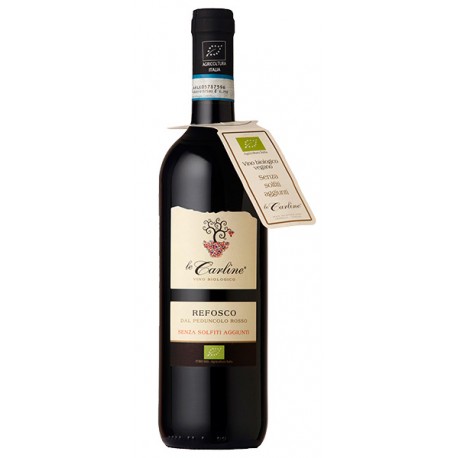Organic Refosco DOC Lison Pramaggiore without sulphites
LCB22
New product
Organic red wine without sulphites.
It’s a wine with a deep red colour with magenta shades, and it’s an austere wine with marked inklings of berries and moss.
Dry and full bodied to the palate.
Alcohol content: 12% vol.
Data sheet
| Export Box: | 6 bottles |
More info
Italian Red Wine BIO
The wine without sulphites
Grapes: Refosco dal peduncolo rosso
Area: Lison Pramaggiore - Italy
Fermentation
- The grapes are carefully cleaned;
- Then follows the dynamic skin maceration exploiting the fermentation gases and traditional punching down.
- Controlled temperature fermentation take place into steel vats.
Maturing
- Malolactic fermentation, leaving the product exposed for few months to its fine activated lees.
- Clarification takes place into steel vats.
- Conservation happens in oxygen absence.
- The final product is the fruit of the single fermentation of the grape juice without addition of any additive.
Sensorial Feature
It presents a deep red colour with magenta shades, and it’s an austere wine with marked inklings of berries and moss.
Dry and full bodied to the palate.
Gastronomic Matches
A perfect combination with braised red meats, grilled meats, poultry and matured cheeses.
Serving Temperature
Best serving at 20° C with wide glass.
As the product has no sulphites we suggest to use it up by two days after uncorking.
Bottle: 750 ml
Analysis
Alcohol content: 12% vol.
Total acidity: 5,1 g/l
Volatile acidity: 0,20 g/
Organic Agriculture
The methods of Organic Agriculture adopted by our company include the development of a sustainable model, based on the principles of preservation and enhancement of resources and respect for the environment and consumer health.
It indicates a method of cultivation that leads us to program the winemaking from the vineyard, believing in the potential of a vineyard without chemical and respectful of the area of the grape, avoiding to force the soil with chemical fertilizers that tend to stimulate the quantitative production of the plant, to the detriment of the qualitative one and to impoverish the precious relationship Land / Plant / Climate which is the necessary balance for the development of a strong vine that produces healthy grapes, balanced and rich and to make identifiable and unique wines.
Organic wine is a product that comes from a type of cultivation with very specific rules, established by Reg. 834/07 and EC Reg. 889/08.
For the fertilization of soils, for example, we use organic fertilizers or green manure and for the protection of crops we preventively treat them with fungicides and pesticides of natural origin (eg. Copper, sulfur, pyrethrum, etc.).
In addition to an undisputed ethical added value, organic wine also incorporates useful substances for the human body, such as resveratrol, that numerous scientific studies have shown to be a protective agent for the cardiovascular system.
It’s since 1991 that the winegrowers are waiting for the Regulation on BIO wine making and finally on the 8th February 2012, the SCOF (Standing Committee on Organic Farming) has voted his approval by the Reg. 203/12.
Until then there wasn’t a specific European Community legislation that regulate the transformation of the grapes in organic wine. From the 1st of August 2012 it came into force the new regulations that, in addition to standardize the techniques of organic winemaking and the usage of oenological adjuvants, allows to pack wine stating in the label “organic wine” rather than “wine from organic grapes” and the possibility to use the European logo which identifies the biological product in the world.
The Grapes
Organic grapes are grown on vines in soils, managed in harmony with nature, containing large numbers of earthworms, beetles and other organisms. The grape varieties chosen are adapted to local conditions and as resistant to disease as possible. From these organic grapes local wineries and chateaux produce high quality and rich wines.







